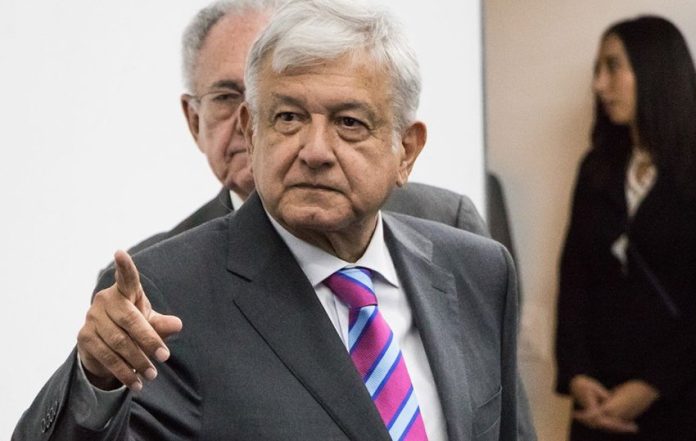The private sector is upset with the decision to cancel the new Mexico City International Airport project because it had big plans to develop the site of the existing airport, charges president-elect López Obrador.
In a video posted to social media yesterday, López Obrador said the business sector had reached an agreement that would allow it to eventually take possession of the Benito Juárez International Airport, located just seven kilometers east of Mexico City’s downtown.
“Now I can say it. During the consultation, I couldn’t speak because I had to act with impartiality but . . . part of the construction [plan] for the airport at Texcoco was for [the private sector] to keep the land of the current airport,” he said.
“I even saw the blueprint. They had already planned to build a kind of Santa Fe on the 600 hectares of the current airport,” López Obrador continued, referring to the Mexico City business and shopping district.
“I understand that they are upset because they won’t be able to do that business.”
Influential private sector leaders slammed the decision to cancel the 285-billion-peso (US $14 billion) airport announced Monday by López Obrador, a day after the public consultation on the project’s future concluded.
Instead, the incoming government plans to build two new runways at the Santa Lucía Air Force Base in México state and upgrade the existing airport and that in Toluca, a proposal that about 70% of people supported in the consultation.
Mexican Employers Federation (Coparmex) president Gustavo de Hoyos said killing the airport project would be “the biggest waste of public resources in the history of the country.”
The vote on the future of the project was a “Mickey Mouse consultation” and a “flagrant violation of the law,” he charged.
Economist Enrique Cardenas of the Iberoamerican University expressed a similar sentiment to de Hoyos, writing on Twitter that scrapping the airport project “will be remembered as one of the worst stupidities from a president in contemporary economic history.”
In yesterday’s video, López Obrador sought to reassure investors and disgruntled business leaders about his decision to respect the will of the approximately 1.1 million people, or just over 1% of the electoral roll, who voted in the consultation.
“We’re not going to commit any injustice with the investors and contractors . . . They will be assured that their work can be carried out, only now they won’t be in Texcoco but in Santa Lucía. We’re going to reach an agreement. Settle down, calm down — a change is taking place in the country,” he said.
“There is nothing to fear. We have said 1,001 times that we will guarantee the investments, the contracts.”
After his landslide victory in the July 1 election, López Obrador also sought to calm fears surrounding the next government’s economic plans, a move which analysts believed initially reassured investors and contributed to a strengthening of the peso.
However, following confirmation of the decision to scrap the new airport, which was considered President Peña Nieto’s signature infrastructure project, the peso lost 3.6% of its value in 24 hours to slump to its lowest level since the election of United States President Trump.
According to the currency exchange website xe.com, one US dollar bought 20.3 Mexican pesos at 5:00pm today. In recent years, exceeding the 20-peso-to-the-dollar threshold has set off alarm bells in Mexico.
López Obrador addressed the decline in his video message, declaring that “there was a slide in the peso, not a devaluation, but it will recover.”
However, it’s not just a weaker peso that is causing concern.
Mexico’s benchmark stock index was down 4.2% at the close yesterday while some analysts believe that projected 2019 growth of 2% may have to be downgraded and foreign capital may flee the country.
Critics of the president-elect’s decision and the way it was made said that cancelation of the airport could diminish investor trust in Mexico during the new government’s six-year term, as Mexico’s two largest banks also warned.
“A lot of foreign investors were looking at this airport issue as a litmus test of [López Obrador’s] pragmatism, or of his radicalism,” said Daniel Kerner, managing director for Latin America with the Eurasia Group, a political risk consultancy.
“I think this showed the reality that López Obrador will go ahead and do whatever he wants.”
Banks JPMorgan Chase & Co. and Itau Unibanco Holding SA both said that due to the decline in the peso they expect the Bank of México (Banxico) to lift interest rates by a quarter point when it makes its next scheduled rates decision on November 15.
“Were the peso to remain under pressure, we’d expect Banxico to acknowledge that upside inflation risks have materialized and convergence to target is at risk, and therefore that a policy response is required,” JPMorgan economists wrote in a report Monday.
There is a significant possibility of a further quarter point or half point hike in December, the economists said.
Kathryn Rooney Vera, head of global research at Bulltick Capital Markets in Miami, made an even more ominous warning about the potential consequences that cancelation of the airport might bring.
“[The decision] could start a vicious cycle, smashing any incipient investor confidence, sending the peso plummeting, inflation rising, Banxico forced to hike and slowing an already slow economy that needs foreign portfolio flows,” she said.
Source: El Financiero (sp), The Los Angeles Times (en), Bloomberg (en)
